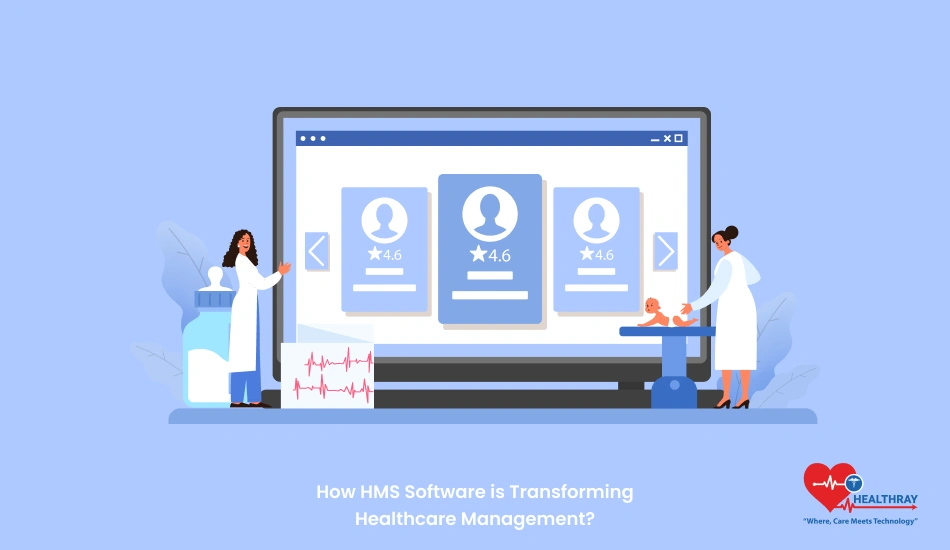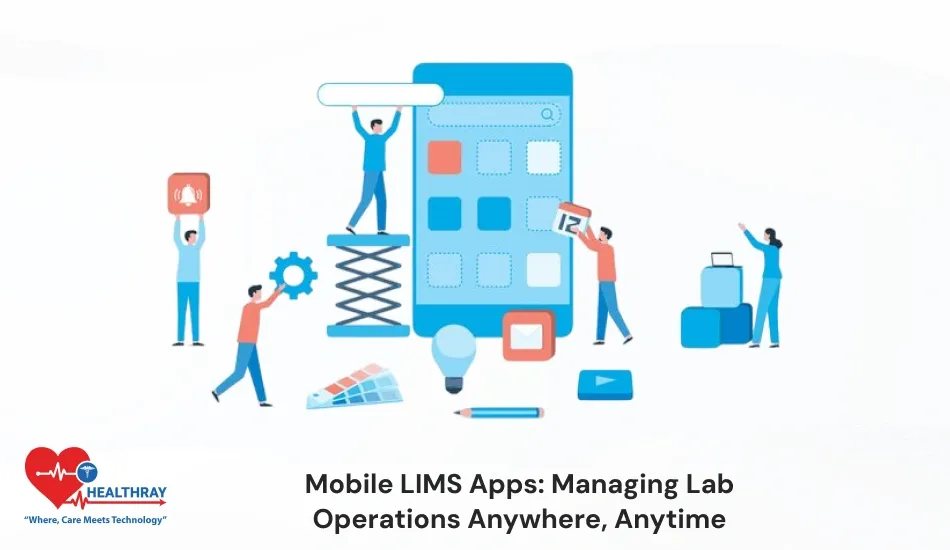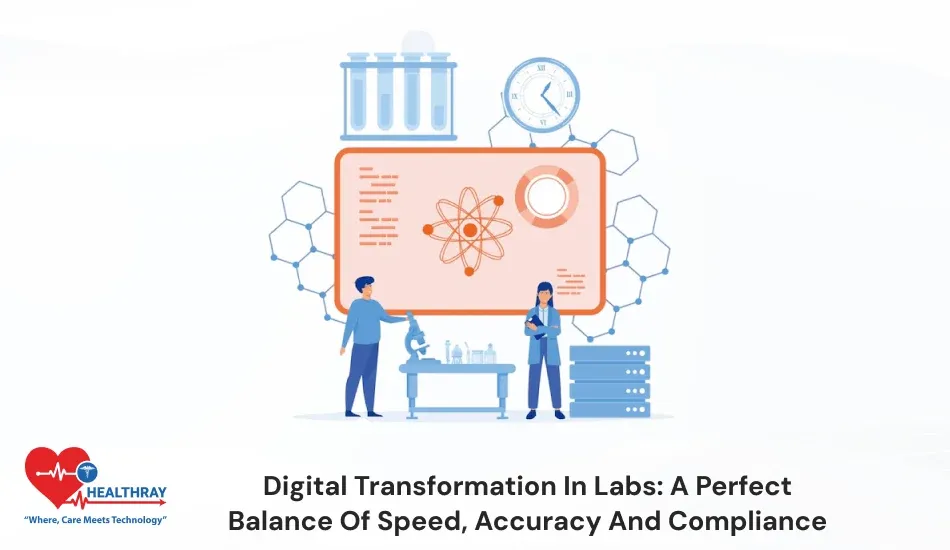How HMS Software is Changing the Healthcare Management Landscape?
How HMS Software is Revolutionizing Healthcare Management?
As hospitals and healthcare providers feel increasing pressure to be more efficient, improve patient care, and comply with regulations, Hospital Management Software (HMS) now come as a potent answer. Such systems are made to automate and streamline a myriad of administrative and clinical tasks, ensuring that hospitals are run more efficiently while focusing on what matters the most: patient care. But what exactly is HMS software and how it transforms the health care management landscape?
Well, that’s what the rest of the article is set out to understand-many ways by which HMS transforms the playing field in hospital management-including reductions of human errors and enhancing telemedicine services.
What is HMS software?

In short, a Hospital Management System is an all-encompassing software platform that would be used to streamline and automate administrative and clinical activities in a health care facility. It includes patient records, appointment scheduling, billing, inventory management, and even regulatory compliance.
This allows health care professionals and administrative staff to spend less time on paperwork, minimize errors, and concentrate more on the patients. For example, Healthray HMS software is a set of functionalities aimed to make hospital operations much better. This is because the system offers a centralized platform for healthcare professionals to log into patients’ data, monitor ongoing treatments, and manage appointments.
Moreover, Healthray supports telemedicine, which allows doctors to consult patients from remote locations-a feature that becomes very handy in today’s very digital healthcare world. The hospital administration can also optimize the use of beds, equipment, and staff schedule in real-time using Healthray HMS.
It is also equipped with advanced data security features to ensure the protection of sensitive patient information, while still being HIPAA compliant.
For hospitals, HMS software like Healthray improves operational efficiency, reduces costs, and enhances the quality of patient care.
It enables healthcare institutions to focus on delivering high-quality care while meeting the evolving demands of the healthcare industry by automating routine tasks and providing real-time data.
How HMS Improves Operational Efficiency?
One of the biggest challenges of hospitals is resource management-including hospital beds, medical equipment, and staff schedule. HMS allows real-time data tracking, through which administrators are able to take decisions quickly. For example, resource management features in HMS help hospitals to monitor equipment usage, reduce equipment downtime, and ensure that supplies are available in case of emergencies.
Aside from resource management, Hospital Management Software System automates numerous routine administrative processes. This involves appointment scheduling; HMS minimizes double bookings and long waiting periods through real-time scheduling options. The software sends automated reminders to patients, lessening the occurrence of no-shows and increasing overall productivity.
HMS also proves to be invaluable in billing and financial management. Most hospitals get derailed on how to handle multiple billing cycles, different payments and insurance claims. HMS eliminates all these wastes by automation in generating invoices, manages payments and even follows the revenue cycle since it develops from the time a patient registers until he or she has paid their last bill.
Through this kind of automation, less human error happens and money gets paid out much faster and without mistakes. HMS also streamlines inventory management. If the stock level is low, the system can automatically generate purchase orders for the required supplies to avoid any shortages that could delay patient care.
Enhancing Patient Care through HMS
While HMS, primarily, intends to enhance efficiency in operations, its impact is most significant at the patient level. Electronic Health Records (EHR), the backbone of most HMS systems, have enabled doctors and nurses, among other clinicians, to be able to refer to the history of a patient’s care directly from any site within the institution.
Through tracking a patient’s treatment, test results, and medication, HMS is less likely to occur because the doctors are able to make more informed care decisions when a patient’s medical history is immediately available. The HMS also supports advanced decision-making tools integrated within the HMS that analyze the data related to the patient and then provides suggestions on possible treatments using up-to-date research and guidelines.
Another way HMS enhances patient care is medication management. The application keeps track of all prescribed medications, including their dosages, any potential drug-to-drug interaction, and patients’ allergies to them. The application can also alert doctors of any potential interactions that may lead to medication error.
HMS also meets the needs of patients by ensuring quick service. It may speed up laboratory diagnosis, hasten the processing of test results, and reduce waiting hours for appointments among other things that enhance efficiency eventually lead to improving patient experience.
Data Security and Compliance
Every day sensitive data is being transferred in humongous amounts, the healthcare industry: from the health records of the patient and other billing information; hospitals are nowadays moving to computerization, resulting in the highest rate of violation of data protection and HIPPA compliance.
The HMS addresses these concerns by using high-level encryption on the patient data. This is irrespective of whether the data is being stored or sent between departments or to other care providers. In addition, access control mechanisms exist in HMS systems that limit who can access which data based on their role at the hospital. For example, a nurse would be able to see treatment records but only administrative personnel could see billing data.
HMS also supports compliance by the hospitals through the rich audit trails that record every access point and change done to the patient information, thereby making accountability and transparency traceable. In cases where there is an issue on who accessed the sensitive information, administrators can track it back to the exact time and user.
Compliance reporting is another very important feature: hospitals can generate the required documentations for the regulatory bodies very easily. It could be HIPAA, GDPR, or local healthcare regulations; HMS makes reporting and compliance easy while reducing the risks of penalties or even legal issues.
Integration of Telemedicine and Remote Patient Monitoring
Telemedicine and remote patient monitoring have exploded over the past year, particularly after the global pandemic. Most HMS platforms today are integrating telehealth features that allow doctors to consult with patients from a distance. It not only helps reduce the pressure on hospital resources but also brings healthcare closer to people, especially in rural or underserved areas.
For patients whose monitoring is strictly real-time-for example, chronically ill-the HMS can be hooked up to the wearable devices or IoT-based health sensors. This wearable device obtains real-time data on heart rates and blood pressures from the patient and sends back to the hospital. Doctors track patients from far away, keeping an eye out for emerging concerns before they balloon into emergencies.
This shift towards remote monitoring and telemedicine helps reduce the burden on hospital staff and provides patients with greater flexibility in managing their health. For hospitals, it offers a scalable way to provide ongoing care without overcrowding facilities or overextending staff.
Cost Savings and Revenue Cycle Management
HMS also saves on operational costs and improves a hospital’s bottom line. By automating billing and financial processes, HMS reduces the possibility of errors that may lead to delayed payments or claim denials. The software can automatically generate invoices, track payments, and even follow up on unpaid bills, thereby streamlining the whole revenue cycle.
Apart from billing, HMS can manage insurance claims much more efficiently. The system verifies the eligibility of the patient, submits claims, and tracks the status of claims. Automating such complex processes can help reduce administrative overheads for hospitals and direct more resources toward patient care.
Ultimately, HMS minimizes paperwork and delays in the hospital, resulting in faster payment and higher revenues. This increased efficiency translates into large-scale cost saving, making HMS a smart investment for healthcare institutions of all sizes.
Challenges in HMS Implementation and How to Overcome Them
Though the advantages of HMS are many, its installation proves to be a challenge for the staff. Among the most common issues raised is the resistance of the staff. Professions in health care that are accustomed to the old ways will not readily embrace such a new system. Hospitals should therefore have some time for in-depth training and clearly spell how HMS facilitates jobs, minimizes paperwork, and makes routine work faster.
Another challenge is the capital investment that would be required for the initial outlay. Even though HMS eventually saves money in the long run, smaller hospitals are deterred by the high licensing fees for the software, upgrading hardware, and training staff. However, many HMS platforms provide cloud-based solutions, which eliminate expensive infrastructure and can scale up and down as required.
Lastly, data migration is a significant challenge. The transition from paper records or legacy systems to the new HMS takes time and makes room for a lot of error-prone process. Migration has to be properly planned by hospitals to ensure that a thorough test of the system occurs before it is activated to prevent data loss.
Future Innovations in HMS
Indeed, the future is very exciting for HMS as regards the evolution of new technologies that are bound to make these systems even more efficient. AI and ML start being used for HMS-based platforms. AI and ML algorithms will be able to analyze petabytes of information with the potential prediction of patient outcomes.
They could indicate patterns of progression and can even indicate a personalized treatment method. Another feature that the IoT is changing in terms of how hospitals, today, perform patient care revolves in the management. There are pieces of wearable equipment reading one’s vital signs and sending them to HMS so doctors can monitor how the patient fares in real time. Telemonitoring options will help the hospitals cope with chronic care as well as post-operative care.
Blockchain technology is another promising innovation. Blockchain technology enhances security and interoperability in the records of the patients. Blockchain technology develops a tamper-proof ledger of medical data, which can be safely shared between healthcare providers to enhance cooperation while maintaining patient confidentiality.
Conclusion
Hospital Software are transforming the way hospitals operate. From automating administrative tasks to improving patient care, HMS helps healthcare providers to provide better outcomes at lower costs and maintain compliance with healthcare regulations. In the future, HMS will play an even more critical role as the healthcare industry continues to evolve with AI, telemedicine, and blockchain.
While true challenges exist in the early phases of implementing the system, long-run benefits of enhanced efficiency, better patient outcomes, and financial savings are a must for any modern health facility to include HMS.ges of implementation are real, the long-term benefits—such as increased efficiency, better patient outcomes, and financial savings—make HMS an indispensable tool for modern healthcare facilities.





